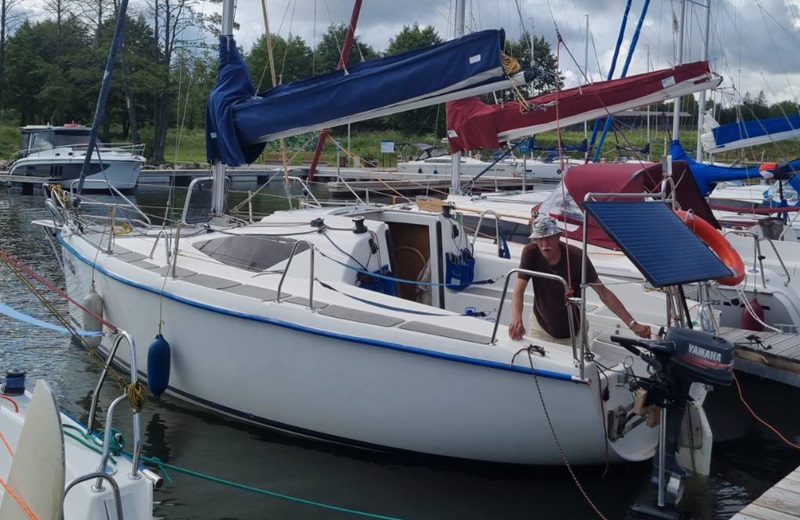Review of Antila 24

Basic specs.

Looking for a new boat? Find an Antila 24 or similar boat for sale
Both the hull and the deck is made of fibreglass. A hull made of fibreglass requires only a minimum of maintenance during the sailing season.
The boat is equipped with 6 berths, a galley, 40 liters (10 US gallons, 8 imperial gallons) fresh water capacity and toilet facility.
The headroom is above average
The Antila 24 is built with a fractional rig. The sail area for the mailsail + jib is 27.0 m2 (290.6 ft2). A fractional rig has smaller headsails which make tacking easier, which is an advantage for cruisers and racers, of course. The downside is that having the wind from behind often requires a gennaker or a spinnaker for optimal speed.
CentreBoard
The Antila 24 is built with a centreboard keel. A centreboard keel is a pivoting lifting keel, allowing to sail both coastal and inland waters.
The boat can sail close to the beach as the draft is just 0.35 - 0.45 meter (1.15 - 1.45 ft) dependent of the load. See immersion rate below.
An outboard motor is often used on this boat for docking and maneuvering. In that case Antila 24 will typically require a power of 4 - 5 hp, alternatively 84 - 101 lbs thrust if you prefer an electrical motor. Electric outboards are becoming popular among sailboat owners who want clean instant power with less noise and no exhaust fumes.
Sailing characteristics
This section covers widely used rules of thumb to describe the sailing characteristics. Please note that even though the calculations are correct, the interpretation of the results might not be valid for extreme boats.
What is Capsize Screening Formula (CSF)?
The capsize screening value for Antila 24 is 2.26, indicating that this boat would not be accepted to participate in ocean races.
Antila 24 holds a CE certification:
If less than 8 in on board the boat is by European Union certified as Class C. INSHORE:The immersion rate is defined as the weight required to sink the boat a certain level.
The immersion rate for Antila 24 is about 152 kg/cm, alternatively 855 lbs/inch.
Meaning: if you load 152 kg cargo on the boat then it will sink 1 cm.
Alternatively, if you load 855 lbs cargo on the boat it will sink 1 inch.
Sailing statistics
This section is statistical comparison with similar boats of the same category. The basis of the following statistical computations is our unique database with more than 26,000 different boat types and 350,000 data points.
What is L/B (Length Beam Ratio)?
The l/b ratio for Antila 24 is 2.58.
The ballast ratio for Antila 24 is 28%.
Maintenance
When buying anti-fouling bottom paint, it's nice to know how much to buy.
The surface of the wet bottom is about 20m2 (215 ft2).
Based on this, your favourite maritime shop can tell you the quantity you need.
Note: If you use a paint roller you will need more paint than if you use a paintbrush.
If you need to renew parts of your running rig and is not quite sure of the dimensions, you may find the estimates computed below useful.
| Usage | Length | Diameter | ||
| Jib sheet | 7.2 m | (23.6 feet) | 10 mm | (3/8 inch) |
| Genoa sheet | 7.2 m | (23.6 feet) | 10 mm | (3/8 inch) |
| Mainsheet | 17.9 m | (58.9 feet) | 10 mm | (3/8 inch) |
| Spinnaker sheet | 15.8 m | (51.8 feet) | 10 mm | (3/8 inch) |
Keels with moving parts need to be inspected and maintained on a regular basis according to advice given in owner's manual. Manufacturers usually advise which maintenance work can be done by the owner and which work should be carried out by a suitably experienced boatyard.
This section is reserved boat owner's modifications, improvements, etc. Here you might find (or contribute with) inspiration for your boat.
Do you have changes/improvements you would like to share? Upload a photo and describe what you have done.
We are always looking for new photos. If you can contribute with photos for Antila 24 it would be a great help.
If you have any comments to the review, improvement suggestions, or the like, feel free to contact us. Criticism helps us to improve.
